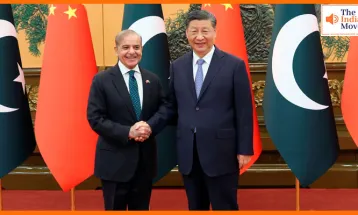
Trump Threatens Tariffs on Russian Oil Over Ukraine War
-
 Chhavi
Chhavi
- March 31, 2025
Trump’s Frustration with Putin
U.S. President Donald Trump has recently expressed strong frustration with Russian President Vladimir Putin, especially after Putin criticized Ukrainian President Volodymyr Zelenskiy. In an interview with NBC News, Trump admitted that he was "pissed off" at Putin, particularly after Putin questioned Zelenskiy’s credibility as a leader. Trump, who has been critical of the war in Ukraine, warned that if he believes Russia is deliberately blocking peace efforts, he will take drastic steps. Specifically, he threatened to impose secondary tariffs of up to 50% on countries buying Russian oil. This move would target nations that continue importing Russian crude oil, even in the face of ongoing sanctions and international calls for Russia to cease its aggression against Ukraine. Trump's anger stems from his belief that Putin’s actions, including undermining Zelenskiy, could derail peace efforts and prolong the war.
Trump’s Proposal for Oil Tariffs
Trump’s threat focuses on imposing secondary tariffs on Russian oil, ranging from 25% to 50%. This would affect countries that continue to engage in trade with Russia, specifically by purchasing Russian oil. The U.S. has not imported Russian oil since 2022, but nations like China and India still rely heavily on Russian crude. Trump’s proposed tariffs aim to disrupt their trade by imposing penalties on countries that do business with Russia. If these tariffs are enforced, it could push China and India to reconsider their reliance on Russian oil, adding more pressure on Russia to reach a peace agreement. The U.S. is using economic pressure as a tool to force Russia into peace talks, signaling that Washington is ready to take a tougher stance on US-Russia relations.

Trump’s Evolving Stance on Russia
Throughout his political career, Trump’s relationship with Russia and President Putin has been a point of controversy. Early in his presidency, Trump was criticized for being too friendly with Putin, raising concerns about his policies being too lenient on Russia. However, since Russia’s invasion of Ukraine in 2022, Trump has repeatedly called for an end to the war, labeling it “ridiculous” and calling for immediate action to stop the bloodshed. His proposed tariffs on Russian oil mark a significant shift in his stance, showing growing frustration with Russia’s lack of cooperation in ending the war. While Trump has expressed a desire for peace, his tough economic approach signals a more aggressive policy toward Russia. The secondary tariffs would target the ongoing trade of Russian crude oil, showing that Trump is increasingly focused on using economic pressure to achieve peace.
Read this also:- पुतिन का भारत दौरा: क्या बदल सकते हैं भारत-रूस के रिश्ते?
Global Impact of Tariffs on Russian Oil
Trump’s proposed tariffs on Russian oil could cause significant disruptions in the global oil market. India, the largest buyer of Russian crude, would face a substantial increase in the cost of Russian oil if the tariffs are enacted. Currently, India imports around 35% of its crude oil from Russia, surpassing China as the biggest buyer of Russian oil in 2024. Countries like China and India, which have increasingly relied on Russian oil due to Western sanctions, would face higher costs if Trump’s secondary tariffs on Russian oil are imposed. The rising cost of Russian crude could force these countries to reconsider their oil imports, potentially disrupting their energy supply chains. While the tariffs would pressure Russia, they could also strain relations between the U.S. and countries like China and India, key players in the global energy market. Additionally, higher tariffs on Russian oil could lead to a spike in global oil prices, which may hurt countries that rely on affordable energy.
Challenges in Enforcing Tariffs and Potential Outcomes
While Trump’s proposal to impose tariffs on Russian oil is bold, experts warn that enforcing such tariffs may be difficult. Since the U.S. stopped importing Russian oil in 2022, tracking which countries are buying Russian oil could prove challenging. Countries like China and India, which continue to import Russian oil, may be unwilling to comply with U.S. demands due to their economic interests. Furthermore, if Trump goes through with these tariffs, it could lead to a diplomatic showdown with China and India, which have strong ties to Russia. There is also the risk that this approach could backfire, pushing these countries to strengthen their alliances with Russia, further undermining efforts to isolate Russia internationally. Despite these challenges, Trump’s approach aims to create additional pressure on Russia to halt its invasion of Ukraine, but the effectiveness of such measures remains uncertain.

Trump’s Ongoing Efforts for Peace and the Way Forward
Despite his frustration with Putin, Trump continues to express a desire to bring an end to the war in Ukraine. His efforts to negotiate peace have included both diplomatic efforts and economic pressure. However, progress has been slow. Trump’s proposal to impose tariffs on Russian oil is part of his broader strategy to force Russia to the negotiating table. While this approach could increase economic pressure on Russia and its allies, it could also complicate diplomatic relations and disrupt the global oil market. The outcome of this strategy remains to be seen, as it involves complex geopolitical dynamics and unpredictable responses from other nations. Trump’s ability to leverage tariffs effectively while maintaining international relations will be crucial to determining whether this tough stance will lead to peace or further escalate tensions between the U.S. and Russia.
In conclusion, Trump’s threat to impose tariffs on Russian oil represents a significant shift in U.S. policy towards Russia. While the secondary tariffs could create economic pressure on Russia and its allies, enforcing these tariffs could be challenging. The global oil market and international relations could experience disruptions as a result of these actions. As the situation evolves, it remains to be seen whether Trump’s strategy will successfully end the war in Ukraine or lead to further diplomatic and economic tensions with Russia, China, and India.
For more articles visit The India Moves
महत्वपूर्ण खबर
Categories
- देश (2084)
- अपराध (147)
- मनोरंजन (340)
- शहर और राज्य (338)
- दुनिया (851)
- खेल (378)
- धर्म - कर्म (638)
- व्यवसाय (182)
- राजनीति (563)
- हेल्थ (187)
- महिला जगत (55)
- राजस्थान (491)
- हरियाणा (61)
- मध्य प्रदेश (57)
- उत्तर प्रदेश (224)
- दिल्ली (256)
- महाराष्ट्र (170)
- बिहार (183)
- टेक्नोलॉजी (187)
- न्यूज़ (82)
- मौसम (108)
- शिक्षा (115)
- नुस्खे (83)
- राशिफल (375)
- वीडियो (1052)
- पंजाब (35)
- ट्रैवल (19)
- अन्य (46)
- जम्मू कश्मीर (84)
- उत्तराखंड (11)
- तेलंगाना (1)
- छत्तीसगढ (5)
- गुजरात (8)
- हिमाचल प्रदेश (1)
- पश्चिम बंगाल (7)
- असम (0)
- केरल (1)
- झारखंड (2)
- ओडिशा (0)
- त्योहार (18)
Vote / Poll
क्या राजस्थान मे बेरोजगारी का मुद्दा खत्म हो चुका है ..












